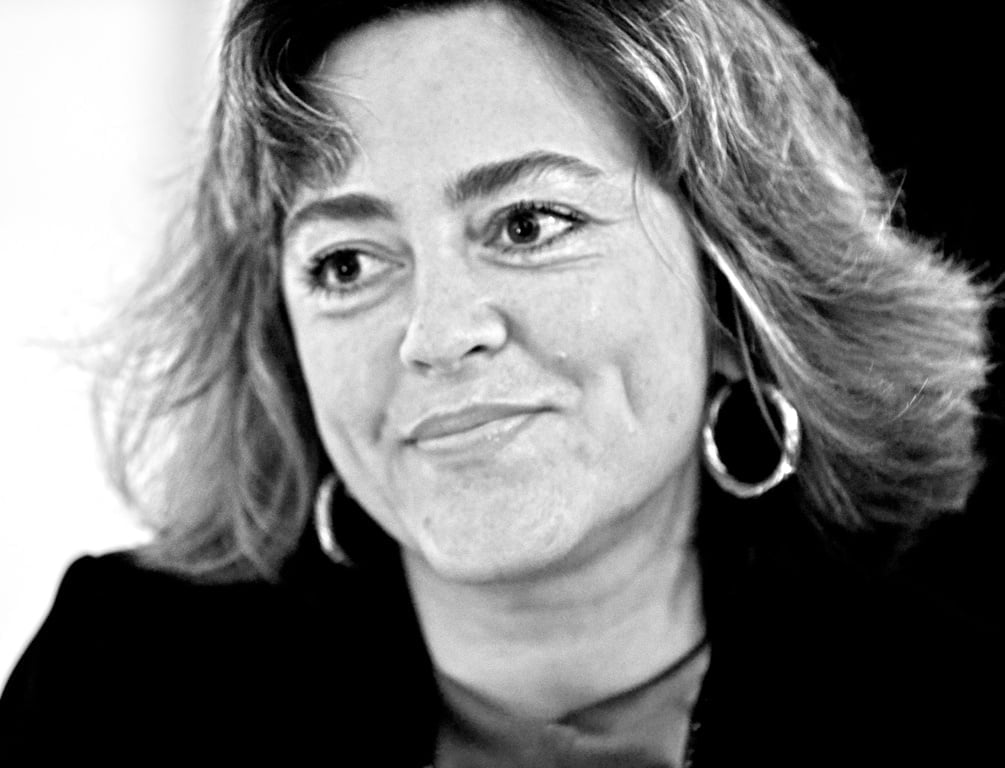
Angelina Polonskaja
Anzhelina Polonskaya was born in 1969 in Malakhovka, a work settlement near Moscow. The daughter of a physician and an ice-skating coach, Polonskaya attended the Institute for Physical Culture and Sport in Moscow and studied Spanish at the Cervantes Institute. She wrote her first verse when she was seven, and by 18 was dedicated to poetry while also pursuing a career as a figure skater with the Moscow and Kiev Ice Skating Ballet Company, which took her on several tours throughout the world. She moved to South America in 1995 and, after returning to Russia, ended her sports career in 1997.
Her first book of poetry »Swetotsch moj nebesnyj« (tr. My heavenly torch) was published in 1994, followed by a series of volumes: »Nebo glasami rjadowogo« (1999; tr. The sky through a private’s eye), »Golos« (2002; Eng. »A Voice«, 2004), »Sneg wnutri« (2008; tr. The snow within), »Schwärzer als Weiß« (2015, tr. Blacker than white). Polonskaja’s poetry makes very little use of Russian role models; even when she appears to be following certain traditions or poetics, she does so merely to disrupt their structure and make the process itself the subject of her poetological method. Although her poetry always has a political tenor – that is, a concern for the situation in her homeland – it is not political in the strict sense. Instead, it embodies a symbiosis of philosophical landscape poetry and intense reflection on the nature of existence. Indeed, the landscape of her poems captures her worldview, which moves over time from excited anticipation to apocalyptic apathy: »Come at dawn my swallows to kill – / because I am the sea …« In 2008, Australian composer David Chisholm asked her to write the libretto for an oratorio about the 2000 sinking of the Kursk nuclear submarine. The piece honors the 118 marines who died in the accident. After its premiere in Melbourne in 2011, Polonskaya was condemned harshly by political figures in Russia and was subsequently no longer able to find a publisher for her work. In this sense, her break with literary traditions in her texts reflects how she sought to overcome the adversities she faced in life. »Grönland« (2016), her first collection of short prose, was inspired by a flight over the glacial landscape of Greenland while en route to America. Much like her poetry, her prose makes use of visually and poetically dense language to create snapshots and reflections in the process of observing snow.
Polonskaya became a member of the Russian PEN center in 2003. She received the Rockefeller Fellowship in 2014 and from 2013 to 2015 was a guest of the Akademie Schloss Solitude in Stuttgart. After that, she was awarded a stipend from the »Städte der Zuflucht« network and moved to Frankfurt am Main. She is a Ord i Grenseland – Words on Borders Freedom Prize laureate.
Swetotsch moj nebesnyj
Moskovski pisatel’
Moskau, 1994
Sneg vnutri
Elinin
Moskau, 2008
Paul Klee’s Boat
Zephyr Press
Chicago, 2013
[engl. Ü: Andrew Wachtel]
Schwärzer als Weiß
Gedichte, zweisprachig
Leipziger Literaturverlag
Leipzig, 2015
[Ü: Erich Ahrndt]
Grönland
Novellenzyklus
Edition Solitude
Stuttgart, 2016
[Ü: Erich Ahrndt]
